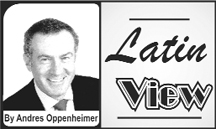While Ecuador’s populist President Rafael Correa steps up his international offensive to grant political asylum to Wikileaks founder Julian Assange, an exiled Ecuadoran journalist seeking political asylum has some very interesting insights into what’s behind the Ecuadorian leader’s latest quest for international attention.
 Emilio Palacio, the former leading columnist of Ecuador’s daily El Universo and author of the soon-to-be published book El periodista de los $80 millones (The $80 million journalist) says Correa’s international media show to protect Assange is not only part of the Ecuadorean president’s effort to repair his own image as a ruthless censor of the press, but is also part of his campaign to become a leader of Latin America’s radical left.
Emilio Palacio, the former leading columnist of Ecuador’s daily El Universo and author of the soon-to-be published book El periodista de los $80 millones (The $80 million journalist) says Correa’s international media show to protect Assange is not only part of the Ecuadorean president’s effort to repair his own image as a ruthless censor of the press, but is also part of his campaign to become a leader of Latin America’s radical left.
Correa suspects that Venezuelan President Hugo Chávez and Cuba’s historic leader Fidel Castro may die soon, and is trying to project his image abroad in hopes of becoming the new leader of the Venezuela-led ALBA bloc of radical leftist countries, Palacio says.
Palacio is one of the several well-known Ecuadoran journalists who have been victims of what leading freedom of the press groups — including the Committee to Protect Journalists, Human Rights Watch and the Inter American Press Association — have described as Correa’s relentless crackdown on freedom of the press at home.
Correa, who has shut down several news outlets over the past year, sued Palacio and three directors of El Universo for $80 million and asked for three years in prison for an opinion column Palacio wrote in which he called the Ecuadoran president a “dictator.” A judge ruled in Correa’s favour and ordered the journalists to pay $40 million, but the president later pardoned them.
Palacio, however, is seeking political asylum in the United States because he has another pending suit filed by the Venezuela-funded pro-Correa Ecuador TV network, and because he feels he would be in danger in his country.
In an interview, Palacio laughed when I mentioned that Assange — who has been holed up at the Ecuadoran Embassy in London for more than two months — has praised Ecuador as “a courageous Latin American nation’’ that “took a stand for justice” by giving him diplomatic protection. Ecuador remains a “dictatorship,” Palacio said.
Palacio said the Ecuadoran president is seeking to outgrow his image as a follower of Chávez and Castro. His ego is too big, and he resents having been treated as a second-tier figure in the ALBA bloc, Palacio says.
When Correa took office in 2007, Chávez publicly referred to him as “this boy,” Palacios says. And Cuba saw Palacios as a somewhat erratic, undependable ally, to the point that while Correa has visited the island at least five times, he was only granted an official visit once, he says.
Sensing there will soon be a leadership vacuum in the ALBA bloc, Correa has been stepping up his international showmanship in recent months, Palacio said.
In April, Correa managed to become the star in absentia of the 34-country Summit of the Americas with President Barack Obama in Cartagena, Colombia, by boycotting the event.
Then, in June, Correa was the only foreign leader who showed up at the Organization of American States annual foreign ministers meeting in Cochabamba, Bolivia, where he made headlines with incendiary speeches against the OAS Human Rights Commission, which had criticized his country’s rights abuses.
In July, Correa asked the Olympic Committee if he could parade in front of his country’s team at the inauguration ceremony of the London Summer Olympics, the Spanish EFE news agency reported. Correa’s petition was rejected by the Committee. Now, Correa is trying to grab international headlines by posing as a champion of the oppressed by granting Assange asylum, Palacio says.
My opinion: Palacio plays a little bit loose with words when he calls Correa a “dictator.” For the time being, Correa is a narcissist populist leader who spends too much time trying to grab absolute powers, and too little to improve his country’s living standards. Yet, Ecuador is not Cuba — yet.
Still, opinions such as Palacio’s don’t justify Correa’s all-out attacks on press freedoms.
As Time magazine’s Tim Padgett rightly pointed out in a recent article, Obama is attacked daily by critics who claim — against all available evidence — that he was not born in the United States, and yet he’s not going around shutting down Fox News and other right-of-centre media, or suing critical columnists.
Palacio is right when he suggests that Correa’s pretension to be seen as a champion of justice could hardly be more hypocritical. The very fact that Correa is saying that he wants to grant Assange asylum in Ecuador — a country with an increasingly unrealizable justice system — claiming that the Australian hacker would lack fair-treatment “guarantees” in Sweden, one of the world’s most respected legal systems, is a joke.
© The Miami Herald, 2012. Distributed by Knight Ridder/ Tribune Media Services.





